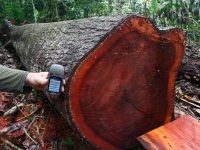Peru's Illegal Hardwood Timber Trade

Francesco Mantuano, an Italian living in Peru with a timber concession in Loreto region, was puzzled when he got a request in July 2010 from a merchant named Mauro Paredes Sandoval to certify hundreds of trees harvested after just eight days of logging. The wood was to be exported by Madrera Bozovich, a Peruvian company, to its sister company in Alabama.
"After putting two and two together, Mantuano concluded that Paredes was only interested in obtaining (his forest transport permits) in order to launder timber which had already been illegally extracted from other areas, ," write the authors of a new report"The Laundering Machine" just published by the Environmental Investigation Agency (EIA), a Washington DC NGO. "The average harvest operation lasts months - but the low water levels and lack of rain at that time of year in Loreto make it difficult to transport timber on the rivers.
The biggest culprit that EIA uncovered is Grupo Bozovich, a family business set up in the late 1940s by Batrich Bozovich when he arrived from former Yugoslavia and set up business in Oxapampa, in central Peru. The group - which now includes Maderera Bozovich in Peru, Bozovich Timber Products in Alabama and a third company in Mexico - is the biggest exporter of hardwoods from Peru and the biggest importer of such hardwoods into the U.S.
The report alleges that at least 45 percent of shipments made Grupo Bozovich "included wood of illegal origin" such as big leaf mahogany and cedar, which are protected under the under the Convention on International Trade in Endangered Species of Flora and Fauna (CITES)
Surveys of forestry concessions used by Grupo Bozovich by the Supervisory Body for Forest and Wildlife Resources (OSINFOR) found some astonishing discrepancies: In the Productores Forestales Atacuaric concession, just one tree was actually cut down but its "extraction" yielded 311 cubic meters of wood. (The harvested tree in question measured just over 12 cubic meters and was found abandoned in the forest) In the Oroza Wood S.A.C. concession, government investigators found 14 cedar stumps that turned out to be "disks of roundwood cut from logs and planted in the ground for the benefit of the supervisors."
"Sometimes intentionally, sometimes through sheer negligence, each of the actors and agencies involved in this system are working as gears in a well-oiled machine that is ransacking Peru's forests and undermining the livelihoods and rights of the people that depend on them," write the EIA investigators. The cost to Peru is estimated to be $250 million a year.
The company denies the allegation. "Bozovich's exports to USA comply with the terms and condition of Lacey Act and the Convention on International Trade in Endangered Species of Wild Fauna and Flora," a U.S. spokesman told Inter Press Service. (The 2008 Lacey Act requires buyers to practice "due care" to make sure that their products are legal. This is typically done by examining the export certificates)
Experts say that the problem is global. "Justice for Timber" - a March 2012 World Bank report explains the extent of the problem: "Every two seconds, across the world, an area of forest the size of a football field is clear-cut by illegal loggers. In some countries, up to 90% of all the logging taking place is illegal. Estimates suggest that this criminal activity generates approximately US $10-15 billion annually worldwide-funds that are unregulated, untaxed, and often remain in the hands of organized criminal gangs."
- 183 Environment



